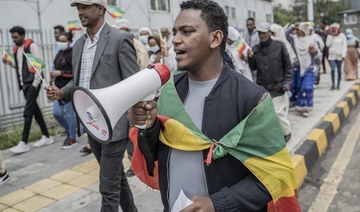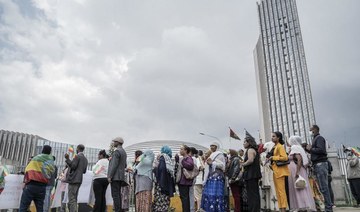NAIROBI: Negotiators from the Ethiopian government and Tigrayan rebel authorities were readying on Monday for peace talks in South Africa aimed at finding a peaceful solution to the brutal two-year war.
The African Union-led negotiations have been flagged to start on Monday, after a surge in fighting that has triggered alarm in the international community.
Kindeya Gebrehiwot, a spokesman for the rebel authorities in Tigray, announced their delegation’s arrival in South Africa in a tweet late on Sunday.
“Pressing: immediate cessation of hostilities, unfettered humanitarian access & withdrawal of Eritrean forces. There can’t be a military solution!” he added.
Addis Ababa said in a statement its delegation had left for South Africa on Monday morning, adding: “The government of Ethiopia views the talks as an opportunity to peacefully resolve the conflict and consolidate the improvement of the situation on the ground.”
But it also said its forces “have continued taking control of major urban centres in the past few days”, without identifying them.
Last week, the government vowed to take control of airports and other federal sites in Tigray from the rebels as Ethiopian and Eritrean troops seized towns in the region including the strategic city of Shire, sending civilians fleeing.
Fighting resumed in August, shattering a five-month truce, and has seen the return of the Eritrean army in support of Ethiopian forces and their regional allies.
In two years, the conflict in Africa’s second most populous country has left millions in need of humanitarian aid, and according to the US, as many as half a million dead.
The South African government itself has not confirmed the talks or disclosed a venue.
Abiy, who sent troops into Tigray in November 2020 promising a quick victory over the northern region’s dissident leaders in the Tigray People’s Liberation Front, had said on Thursday the war “would end and peace will prevail.”
“Ethiopia will be peaceful, we will not continue fighting indefinitely,” said Abiy, who won the 2019 Nobel Peace Prize.
International calls for a ceasefire and a withdrawal of Eritrean troops have grown since the AU failed earlier this month to bring the warring sides to the negotiating table.
The return to the battlefield in August halted desperately needed aid for Tigray’s 6 million people who lack food, medicine and basic services.
Tigray has been under a communications blackout for over a year, and independent reporting from the region has been heavily curtailed.
The UN Security Council held a closed-doors meeting on Friday to discuss the spiraling conflict and fears for civilians caught in the crossfire.
The US envoy to the United Nations, Linda Thomas-Greenfield, said after the talks that thousands of Ethiopian, Eritrean and Tigrayan forces were engaged in active combat.
“The scale of the fighting and deaths rival what we’re seeing in Ukraine, and innocent civilians are being caught in the crossfire,” she said.
“Over two years of conflict, as many as half a million — half a million — people have died, and the United States is deeply concerned about the potential for further mass atrocities.”
The International Crisis Group think tank said while reliable data was scarce, it believed the fighting since August alone may have involved more than half a million combatants and killed tens of thousands of people.
“According to most estimates, it is among the world’s deadliest conflicts,” it said in a report Friday.
The IGC’s Ethiopia senior analyst William Davison said the planned talks were a “positive development” but warned “major obstacles to peace remain” including the government’s attempted takeover of federal facilities in Tigray.
“The first objective for mediators is therefore to try and get the federal and Tigray delegations to agree to a truce despite the momentum towards continued military confrontation,” he said.
The AU’s Peace and Security Council also met Friday, saying it welcomed “the mutual commitments to genuinely participate in the peace process” and hoped for a “fruitful outcome.”
The AU’s mediation team for the talks was to include Horn of Africa envoy Olusegun Obasanjo, South Africa’s former deputy president Phumzile Mlambo-Ngcuka and former Kenyan president Uhuru Kenyatta.
The conflict began two years ago when Abiy sent troops into Tigray, accusing the TPLF, the region’s ruling party which resisted central authority, of attacking army camps.














